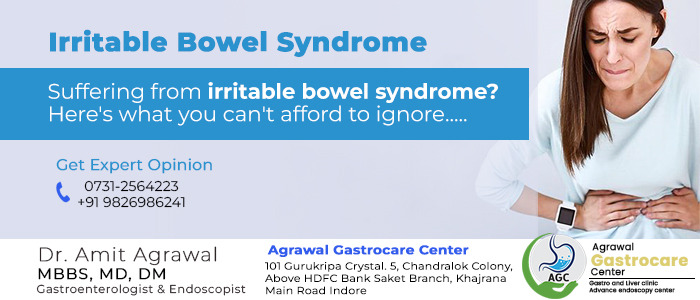
Irritable Bowel Syndrome and Its Symptoms – Agrawal Gastrocare Center Indore
An irritable bowel syndrome (IBS), also known as spastic bowel, is a functional gastrointestinal disorder marked by a constellation of symptoms which include abdominal pain and changes in bowel movements.
Many theories have been proposed about the causes of IBS. These theories include issues with the gut-brain axis, neurotransmitters, intestinal motility disorders, and infections, such as bacterial overgrowth in small intestines, pain sensitivity, genetic factors, and food sensitivities.
The prevalence of IBS in the developed world is estimated at 10–15%. This varies depending on the country and the definition of IBS used; however, the pooling of multiple studies shows an average prevalence of 11.2%.

Symptoms of Irritable Bowel Syndrome
There is abdominal pain or discomfort along with frequent diarrhea or constipation and a change in bowel habits. Symptoms often occur as acute attacks that subside within one day, but recurrent attacks may occur.
1. Aches and cramps
Low abdominal pain after a bowel movement is the most common symptom of IBS. Dietary modifications, stress-reduction therapies, and certain medications can reduce pain.
2. Constipation
Contraction in IBS can also cause a sensation of an incomplete bowel movement, leaving you to strain unnecessarily. You should also drink more water, eat more fiber, take probiotics, and only use laxatives as necessary.
3. Depression and Anxiety
There is a link between IBS symptoms and anxiety and depression, as well. Experts aren’t sure whether IBS symptoms are the result of mental stress or whether the stress of living with IBS makes people more susceptible to psychological problems.
4. Insomnia and fatigue
In a study of 112 adults with IBS, 13% reported poor sleep quality. Sleep problems are also associated with IBS, including difficulty falling asleep, waking frequently, and feeling tired.
5. Food Intolerance
It is unclear why a large proportion of people with IBS avoid food. Food intolerances are not allergies, and food triggers don’t cause measurable differences in indigestion.
6. Inflammation and Gas
Those who suffer from IBS experience bloating as a result of disturbed digestion. Bloating is one of the most annoying symptoms of IBS.
Symptoms from IBS may flare up during your menstrual cycle. These symptoms often come back repeatedly and can make you feel stressed. If these symptoms persist, speak with your gastroenterologist.




